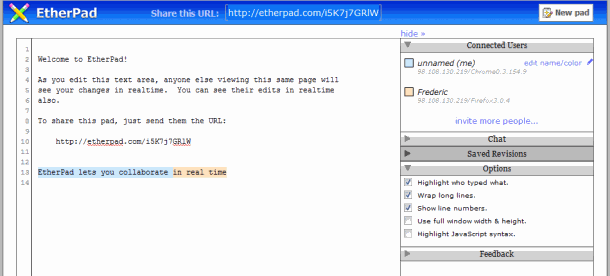EtherPad is not likely to win a prize for its user interface design, but it may just be one of the most useful web apps we have seen in quite a while. EtherPad allows you to instantly create a workspace for text documents that you can then share with your colleagues, clients, or friends. Every edit to the document will immediately appear on your co-workers’ screens in real-time.

EtherPad acknowledges that Google Docs already allows for a similar kind of collaboration, but compared to EtherPad, Google Docs is clunky and slow when you just want to collaborate on a simple text document.
Editor’s note: Looking back over 2008, there were some posts on ReadWriteWeb that did not get the attention we felt they deserved – whether because of timing, competing news stories, etc. So in this end-of-year series, called Redux, we’re resurrecting some of those hidden gems. This is one of them, we hope you enjoy (re)reading it!

EtherPad would be a great tool if you want to keep collaborative notes during a conference call or meeting, but you could also use it to draft or edit text for a press release or email collaboratively.
No Sign-Up
EtherPad, for example, doesn’t require you to sign-up before you start working on your document. You can also just share your workspace’s URL with your co-workers and they, too, don’t have to sign up. Indeed, you can’t even sign up for the service, which may become a bit of a problem if you want to go back to a document you worked on earlier but don’t remember the randomly assigned URL.
Google Docs requires you to send an email invitation to all your collaborators, and updates to documents don’t appear in real-time.

Features
EtherPad also has a versioning system that allows you, or anybody else with access to your workspace, to save the document at any time.
Developers who want to share code might also find this a useful tool, as it can highlight JavaScript syntax. Looking at EtherPad’s heritage, it becomes clear why the developers added this feature. The service was developed by AppJet, an online web programming platform, and is basically a showcase for the next version of AppJet’s tools, but was mainly created because the developers at AppJet were looking for a tool that had EtherPad’s functionality but weren’t able to find one.
Verdict
As is often the case, the most useful tools are those that have a relatively restricted feature set but allow users the freedom to use them as they see fit. EtherPad is one of these services and it will probably become a standard tool for us very soon.
You can find a screencast of the product here, but given that you don’t have to sign up for it, you may just as well try it out for yourself (or join this workspace we already created).
















